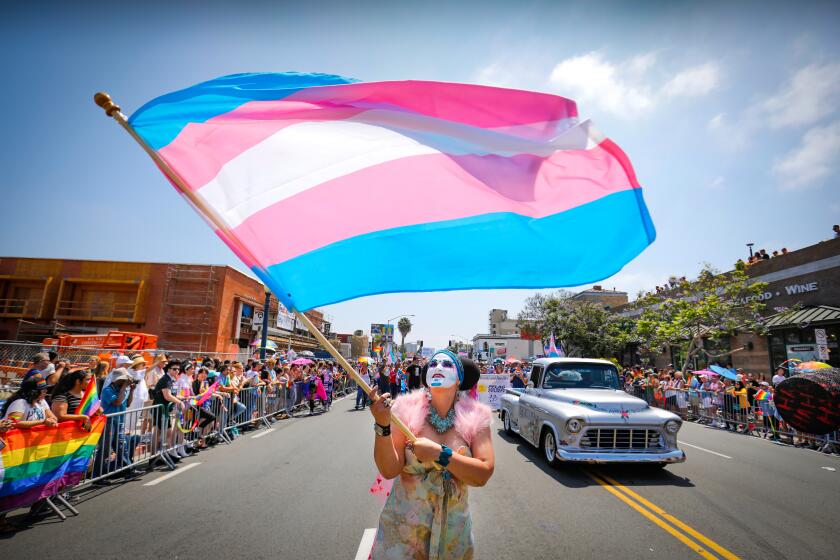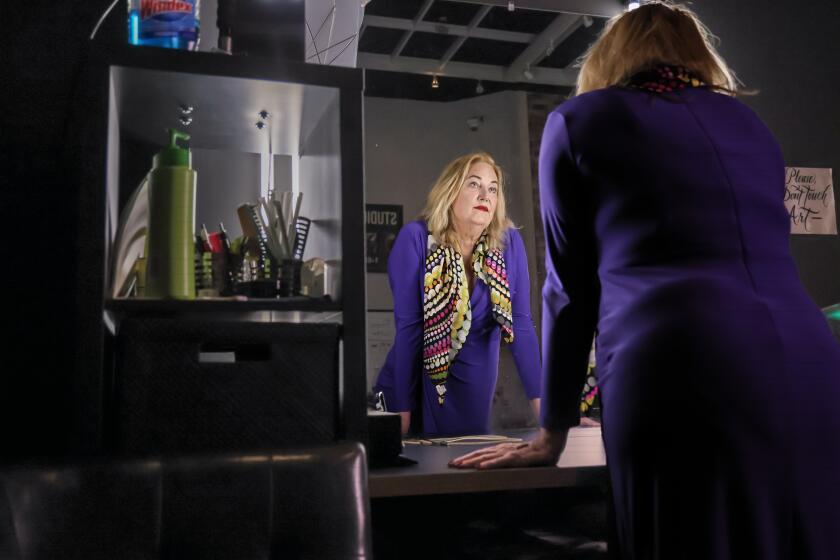
- Share via
Wearing pigtails, a pleated skirt and a furry heart-shaped purse, Chloe Cole bounced up the steps of the California Capitol this spring, leaned into a microphone and insisted that transgender children don’t exist.
For the dainty 19-year-old, to erase transgender children is to erase a part of her past.
Cole has said publicly and in court documents that she first began questioning her gender identity when she was 12. She left a letter on the dining room table telling her family that she was a boy. She wanted a new name, like Ky or Chi, and a more comfortable life.
With the blessing of her parents, who sought the advice of physicians and mental health experts, the self-described socially awkward kid from the Central Valley received routine injections to suppress her puberty and boost testosterone. She was glad when her voice got deeper and her jawline became more defined. In 2020, at age 15, she underwent a double mastectomy in pursuit of her most authentic self.
But now, Cole identifies as a woman and says she regrets those decisions. And she’s making a career out of that regret — traveling the country as a leader of the controversial “detransition” movement and emerging as a right-wing icon.
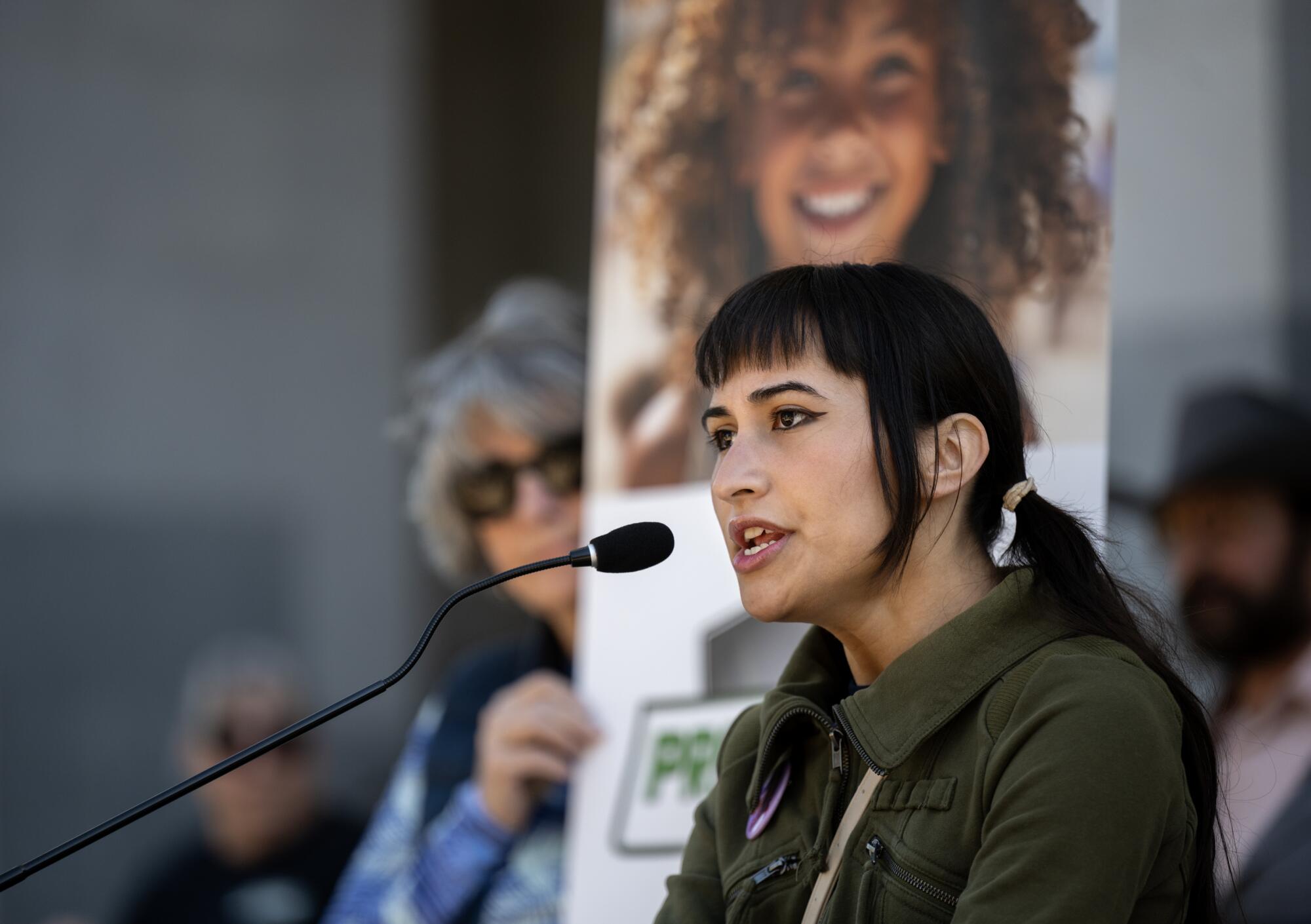
“We’ve finally been given the megaphone to help individuals out of their mistakes, to help other people from falling into the same trauma and hardships that we have endured,” Cole said at a rally in Sacramento in March where she called for a ban on the same medical treatment she once received.
Research shows that youths receiving the kind of care that Cole did at her age is rare and that the likelihood of transgender people changing their mind is even rarer, with some studies showing as little as 2% seek to detransition.
But while Cole’s experience may be uncommon, her reach is wide. In the last year, she has testified before Congress about being “the victim of one of the biggest medical scandals in the history of the United States of America”; attended President Biden’s State of the Union address as the guest of Republican House Speaker Mike Johnson; and urged lawmakers across the nation to outlaw treatment such as hormone therapy for minors. Half of states now prohibit gender-affirming care for those under 18, including Wyoming, where Republicans christened their ban passed in April as “Chloe’s law.”
Major medical organizations condemn the policies that Cole promotes, and LGBTQ+ activists warn that people like her are a danger to already vulnerable youths. They worry that the amplification of her story is part of an organized effort by conservatives to discriminate against LGBTQ+ young people whose access to care is crucial to their well-being, citing high suicide rates among transgender people.
Our happiness is largely a product of how we are treated by the people around us.
Most of Cole’s critics don’t deny her personal story in the same way that she discredits the experiences of hundreds of thousands of transgender youths. But as her profile rises, they question her motives.
Cole, who turns 20 this month, works as a patient advocate for the new nonprofit Do No Harm, a leader of anti-transgender legislation, and charges up to $5,000 to speak at public events about gender ideology, according to the Young America’s Foundation, which represents conservative personalities such as Ben Shapiro. She’s told her story on the podcast of hard-right Republican Rep. Marjorie Taylor Greene and joined Charlie Kirk, a leader of the MAGA movement, on college campuses where students protest her presence.

“She has been amplified. There is a stardom around her now,” said Kathie Moehlig, the mother of a transgender son and executive director of TransFamily Support Services. “The narrative that’s being stated is based in hate. It is based in discrimination, and it is based in lies.”
The gap between how Cole views her mission and how advocates like Moehlig do is vast. In March, the day after Nex Benedict’s death was ruled a suicide — a nonbinary 16-year-old from Oklahoma who died after a bullying incident at school — Cole was comparing support for transgender youths to “child abuse” in her Sacramento talk, giddy and bobbing up and down with energy.
She stopped to take selfies with her supporters and dole out hugs. She said her movement — one that others warn will lead to the harm and even death of transgender children — is “beautiful” and “about love.”
“We love you, Chloe!” someone yelled from the small crowd on the state Capitol lawn.
Cole, wearing a button that reads “protect weird girls,” beamed from behind a lectern.
Then, a passerby shouted out.
“Leave trans kids alone, you absolute freaks!”
Cole’s smile quickly faded.
The details of Cole’s transition journey are playing out in court, as she sues her medical providers for giving her the treatment that a few years earlier she begged her parents to pursue.
Cole — who said she does not use her real last name out of safety concerns — says now that she was never actually transgender, just confused and anxious about puberty. She alleges that her medical providers were too quick to diagnose her and ignored a list of other mental health problems that she believes, if properly treated, could have prevented the medical interventions she now regrets.
She has turned her transition process — which she once viewed as the reflection of supportive parents, uncommon for LGBTQ+ youths — into a nightmarish cautionary tale.
The mastectomy initially came to her as a relief after spending her days uncomfortably binding her breasts, walking home from school under the blaze of triple-digit San Joaquin Valley summers wearing extra layers to help her disguise. Now, she talks at public events and on conservative media about her surgery scars in grotesque detail, describing infections and mourning that she will never be able to breastfeed her future children.
According to court documents, a doctor was frank with Cole’s parents about the risks of denying gender-affirming care and asked: “Would you rather have a dead daughter, or a live son?”

That question is predicated on recommendations from major medical organizations including the American Academy of Pediatrics that say gender-affirming care is “medically necessary” and potentially “lifesaving” because of the trauma that transgender kids may face. One large study out of Denmark last year showed that transgender people are 7.7 times more likely to attempt suicide and 3.5 times as likely to die by suicide.
But Cole’s case has tapped into concerns — on both sides of the political divide — about the right age for gender-related medical treatment. Last month, the Biden administration said it opposed gender-affirming surgery for minors amid debates about the minimum age for different types of care. England recently moved to limit the ability of people younger than 16 to medically transition, and some experts considered LGBTQ+ allies have expressed hesitation amid rising transgender youth rates.
Erica Anderson took more than half a century to come out as a woman. Now she works with teens in a rush to transition.
Dr. Marci Bowers, president of the World Professional Assn. for Transgender Health, said that medical intervention is right for the “vast majority” of patients and that doctors are required to follow “careful and deliberate” standards. Surgery for minors is rare, she said, and reserved for severe cases.
“Gender diversity is a human condition that has always existed and deserves access to healthcare — and whose access can be lifesaving,” said Bowers, a Bay Area gynecologist who has performed thousands of gender-affirming surgeries.
In Cole’s medical negligence lawsuit, filed last year in San Joaquin County Superior Court against the healthcare company Kaiser Permanente and her doctors, the question of her suicide risk is portrayed as a scare tactic.
Cole’s attorneys allege that her doctors are guilty of “manipulating” her and her parents into a “false decision.” Her lawyers include Harmeet Dhillon, a committee member for the national Republican Party who recently spoke at the Republican National Convention in support of former President Trump and has represented him in some of his legal cases.
“This case is about a team of doctors who decided to perform a mutilating, mimicry sex change experiment on Chloe, then a thirteen-year-old vulnerable girl struggling with complex mental health co-morbidities, who needed love, care, attention, and regular weekly psychotherapy, not cross-sex hormones and mutilating surgery,” the lawsuit states.
While the lawsuit focuses on allegations of inadequate information and consent, Cole’s own account describes her parents jumping multiple hurdles within the healthcare system to get their struggling child the care she said she needed.

Cole and her parents had numerous visits with mental health providers, according to the lawsuit. They saw an endocrinologist who said she was too young for hormone therapy, then got a second opinion from another doctor who approved the treatment. Consent forms were signed, and a “pre-operation psychological evaluation” was required before the mastectomy.
Kaiser Permanente spokesperson Kathleen Campini Chambers declined to comment on Cole’s case but said in an email that the company offers “compassionate and clinically informed” transgender care services that align with guidelines endorsed by major medical associations.
“When adolescent patients with parental consent seek gender-affirming care, the patient’s care team carefully evaluates treatment options and then a multidisciplinary team of physicians and other experienced professionals are available to provide the patient and family with information, counseling and other support,” Campini Chambers said.
Supreme Court may be about to decide whether to hear a dispute over restrictions on transgender care for minors, potentially impacting laws in nearly half of states.
Cole doesn’t just blame her doctors and therapists for her transition. In her lawsuit, she names a long list of other people and factors that pushed her there.
She blames the internet and LGBTQ+ influencers she followed on social media at a young age. She blames a boy who assaulted her in the eighth grade by groping her breasts in class — an incident she said traumatized her and made her no longer want to be a girl. She blames being on the autism spectrum, though she does not have an official diagnosis. She blames what she called the horrors of being a woman and the odds of being raped. The youngest of five siblings, she blames being a tomboy who simply looked up to her brothers and wanted to be like them.
“The stress that these kids are going through is very real, but I don’t believe in the concept of a trans kid or that transgenderism is an innate identity,” Cole told The Times. “It’s just something that is an action. ... It’s something that I believe comes from other factors in your life, other stressors.”
Among the stressors named in Cole’s lawsuit: disruptive behavior disorder, ADHD, anxiety, an eating disorder, “social troubles.” Her attorneys even name surgeries she had to repair a cleft palate she was born with as something that “may have influenced her sense of defectiveness as a girl.”
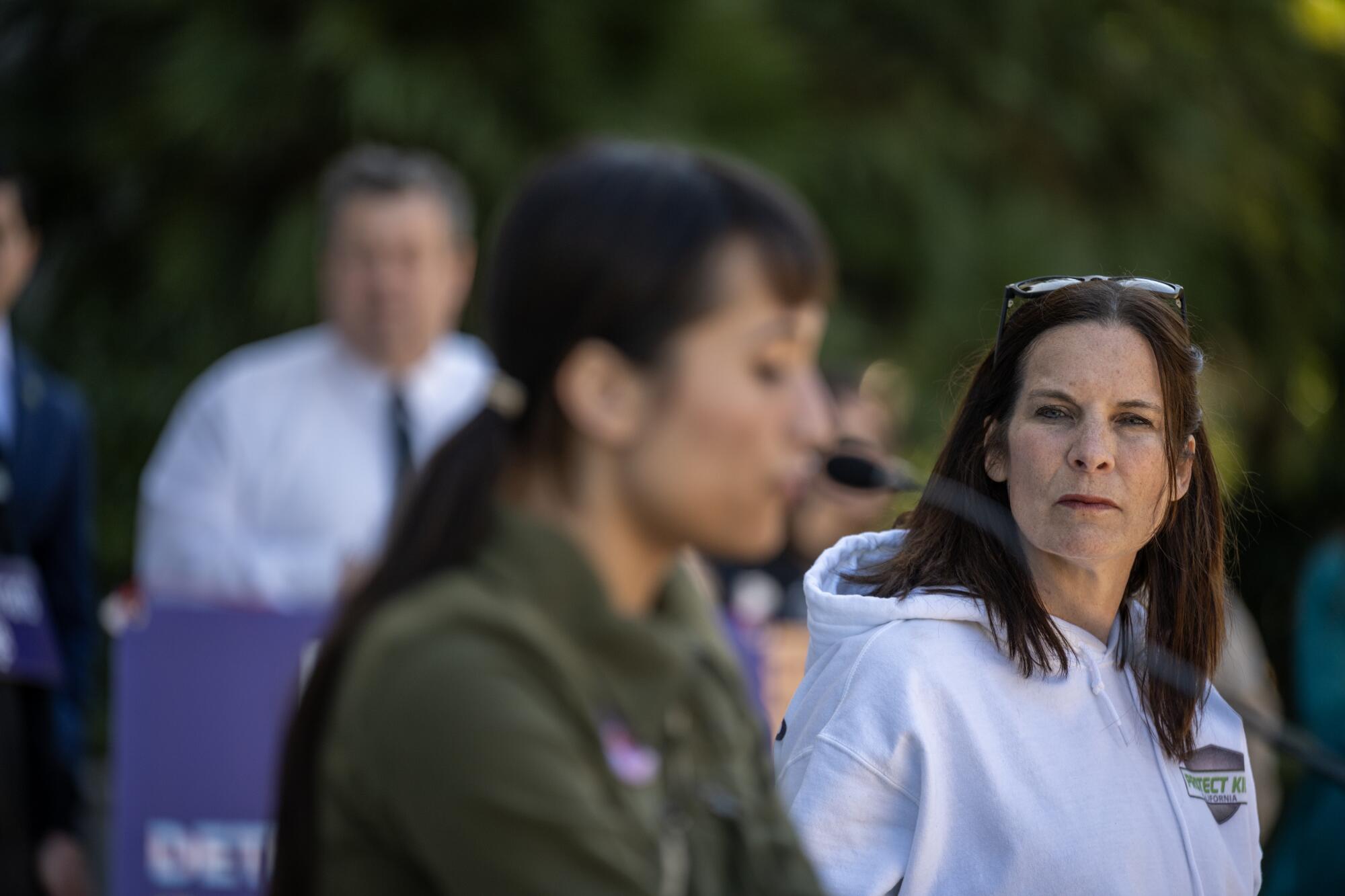
Cole stops short, though, of blaming her parents. She said that she still lives with them and they have “managed to heal as a unit,” but it hasn’t been easy.
“This is my decision that I took on. I don’t want to put that on them. I feel like they have gone through just as much grief as I have,” Cole said. “This is something that has brought them a lot of pain. They have a lot of guilt.”
Records show her parents filed for divorce in 2019 in the throes of her transition. They did not respond to requests for comment.
To chalk up being transgender to a symptom of some disease or as a flaw that needs to be fixed is offensive to the community but is not a new strategy for conservatives. The national GOP platform approved at the Republican convention last week pledges to “end left wing gender insanity” and calls to stop schools from “promoting” gender transition and to “keep men out of women’s sports.”
California courts will uphold, overturn or set ground rules for culture war battles in school districts over parent notification, book restrictions and even public records.
Ash Orr, spokesperson for the National Center for Transgender Equality/NCTE Action Fund, said growing bans on gender care are rooted in “fearmongering and misinformation.” Anyone who has detransitioned, though, should be allowed to do so without stigma and get the care they need, Orr said. And transgender youths deserve the same.
“The truth is that transgender people deserve competent and compassionate healthcare as they seek to live their best lives — and that very few ever regret receiving this care,” Orr said.
One of Cole’s therapists, an expert witness in the case, details the moment that she decided to detransition.
She was 16 and had used her chore money to buy LSD. In a state of “bliss and happiness,” Cole heard a voice “telling her that she was lying to herself about being a boy,” according to a declaration submitted to the court.
She then became a Christian, according to the declaration, and requested a Christian therapist.
When she detransitioned, Cole said she lost all of her friends. She dropped out of high school and took a proficiency exam in lieu of graduating.
“It felt like the whole world was turning its whole back on me,” she said. “I was basically a shut-in. I was spending my whole day playing video games in my room.”
She also lost her online community of LGBTQ+ supporters.
So she found a new one.

Some of the biggest names in the conservative movement have welcomed Cole with open arms, including psychologist and author Jordan B. Peterson, who called gender dysphoria a “sociological contagion,” and activist Billboard Chris, who called gender-affirming care “the biggest child abuse scandal in the history of modern medicine.”
Cole’s schedule stays packed. When she speaks at events across the country, she receives standing ovations and the attention of sympathetic audiences. They cheer when she announces she’s suing, and gasp in disgust when she talks about her surgery.
That acceptance keeps Cole going even as students have protested her events at college campuses in Iowa, Indiana, New Hampshire and Utah, where she tells her story again and again and holds signs outside classrooms that say things like “children are never born in the wrong body.”
Conservatives and right-wing agitators are waging a well-coordinated, anti-LGBTQ+ culture war in local school districts across California.
She has more than 20,000 subscribers on YouTube and more than 200,000 followers on the social media platform X. Her supporters make donations to her website to help fund her travel for her advocacy work.
Cole, a registered Republican who will soon vote in her first presidential election, has gotten bolder since she began public speaking. Four months ago, she was adamant that she didn’t care about politics.
“I wouldn’t say that I associate with one party,” she said in March. “Above all, I’m pro-human. I love humanity. It’s not about politics for me.”
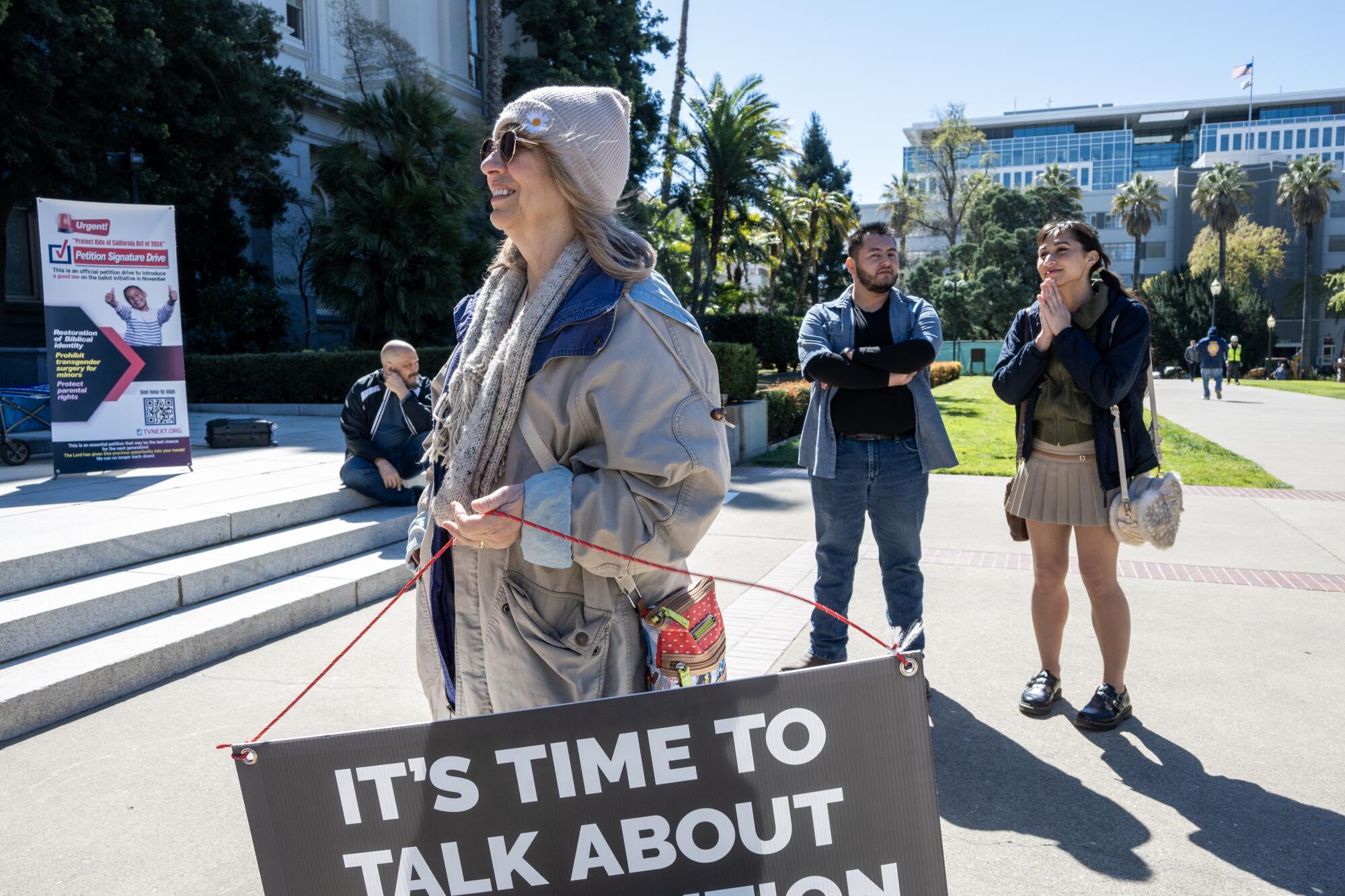
But as November nears, Cole is using her platform to support Trump. Online, she’s posted a video of her shooting a gun at a shooting range in support of the Republican nominee’s endorsement from the NRA; praised Tesla founder Elon Musk for moving his companies out of California over the state’s new transgender youth protections and called transgender people part of a “self-harm cult.”
In her lawsuit, attorneys allege that Cole wanted to transition in part because she “craved the social approval” that transgender kids received from the LGBTQ+ community “that she was not otherwise receiving from her peers.”
As she expands her role as spokesperson for a movement, Cole collects the friends and acceptance she has always sought — this time from a prominent faction of the Republican Party.
“It’s brought a lot of value into my life that I didn’t have before,” Cole said in Sacramento as her fans waited for a chance to speak to her. “I’ve always wanted to sort of be out there.”
More to Read
Sign up for This Evening's Big Stories
Catch up on the day with the 7 biggest L.A. Times stories in your inbox every weekday evening.
You may occasionally receive promotional content from the Los Angeles Times.
